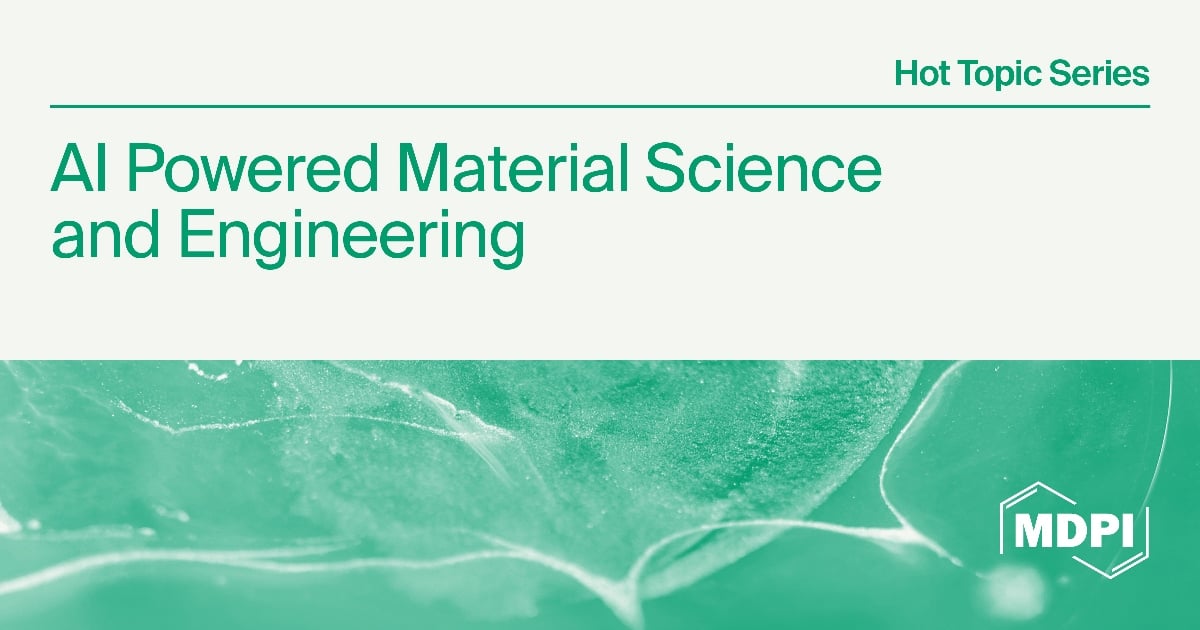
Hot Topic Series | AI-Powered Material Science and Engineering
AI-powered material science and engineering is a rapidly growing and highly popular research field at the intersection of artificial intelligence and materials innovation. By leveraging machine learning algorithms, AI accelerates the discovery, design, and optimization of new materials, significantly reducing time and costs compared with traditional trial-and-error methods. Researchers use AI to predict material properties, screen vast databases, and simulate complex behaviors under various conditions. This transformative approach is revolutionizing industries such as energy, electronics, and healthcare. With increasing investments and breakthroughs, AI-driven materials science is now a hotspot in both academia and industry, offering immense potential for sustainable and high-performance material development.
To advance this transformative frontier, we invite you to explore a curated collection of cutting-edge research articles, journals, and Special Issues spanning diverse domains within AI-powered material sciences and engineering, including intelligent materials design, autonomous experimentation, multiscale modeling, and sustainable materials innovation. By disseminating these breakthroughs, we aim to inspire, accelerate, and champion innovation in materials research, translating scientific discovery into collaborative dialog and real-world applications that will shape a more resilient and sustainable future.



Keynote Speakers:
 |
 |
|
Prof. Dr. Stefano Mariani |
Prof. Dr. Jian Feng Wang |
Free to register for this webinar here!


Prof. Michele Parrinello is an Italian physicist particularly known for his work in molecular dynamics, the computer simulation of physical movements of atoms and molecules. To honor his enduring legacy in advancing computational science, MDPI is proud to establish the Michele Parrinello Award through the initiative of his former student, Prof. Xin-Gao Gong. This biennial international award recognizes senior researchers who have made outstanding contributions to computational physical sciences, encompassing physics, chemistry, and materials science with particular emphasis on pioneering contributions to foundational science.
Nomination deadline: 31 March 2026.
Prize:
- EUR 50000;
- An award medal and a certificate.
For more details about the award, please visit here.

We are honored to present a series of thought-provoking interviews with pioneering experts at the forefront of AI-powered materials science and engineering, as they share their transformative journeys and visionary insights on accelerating material discovery, innovation, and sustainable development across diverse scientific and industrial landscapes.
 |
Name: Dr. Fernando Gomes de Souza Junior |
 |
Name: Dr. Pedro Morouço |

“A Comprehensive Review of Machine-Learning Approaches for Crystal Structure/Property Prediction”
by Mostafa Sadeghian, Arvydas Palevicius and Giedrius Janusas
Crystals 2025, 15(11), 925; https://doi.org/10.3390/cryst15110925
“Synthetic Rebalancing of Imbalanced Macro Etch Testing Data for Deep Learning Image Classification”
by Yann Niklas Schöbel, Martin Müller and Frank Mücklich
Metals 2025, 15(11), 1172; https://doi.org/10.3390/met15111172
“Enhancing Biomedical Metal 3D Printing with AI and Nanomaterials Integration”
by Jackie Liu, Jaison Jeevanandam and Michael K. Danquah
Metals 2025, 15(10), 1163; https://doi.org/10.3390/met15101163
“Machine Learning in the Design and Performance Prediction of Organic Framework Membranes: Methodologies, Applications, and Industrial Prospects”
by Tong Wu, Jiawei Zhang, Qinghao Yan, Jingxiang Wang and Hao Yang
Membranes 2025, 15(6), 178; https://doi.org/10.3390/membranes15060178
“Interpretable Machine Learning Prediction of Polyimide Dielectric Constants: A Feature-Engineered Approach with Experimental Validation”
by Xiaojie He, Jiachen Wan, Songyang Zhang, Chenggang Zhang, Peng Xiao, Feng Zheng and Qinghua Lu
Polymers 2025, 17(12), 1622; https://doi.org/10.3390/polym17121622
“Integrating Machine Learning into Additive Manufacturing of Metallic Biomaterials: A Comprehensive Review”
by Shangyan Zhao, Yixuan Shi, Chengcong Huang, Xuan Li, Yuchen Lu, Yuzhi Wu, Yageng Li and Luning Wang
J. Funct. Biomater. 2025, 16(3), 77; https://doi.org/10.3390/jfb16030077
“Influence of Processing Parameters on Additively Manufactured Architected Cellular Metals: Emphasis on Biomedical Applications”
by Yixuan Shi, Yuzhe Zheng, Chengcong Huang, Shangyan Zhao, Xuan Li, Yuchen Lu, Yuzhi Wu, Peipei Li, Luning Wang and Yageng Li
J. Funct. Biomater. 2025, 16(2), 53; https://doi.org/10.3390/jfb16020053
“Prediction of Mechanical Properties of 3D Printed Particle-Reinforced Resin Composites”
by K. Rooney, Y. Dong, A. K. Basak and A. Pramanik
J. Compos. Sci. 2024, 8(10), 416; https://doi.org/10.3390/jcs8100416
“Data-Driven Optimization of Plasma Electrolytic Oxidation (PEO) Coatings with Explainable Artificial Intelligence Insights”
by Patricia Fernández-López, Sofia A. Alves, Aleksey Rogov, Aleksey Yerokhin, Iban Quintana, Aitor Duo and Aitor Aguirre-Ortuzar
Coatings 2024, 14(8), 979; https://doi.org/10.3390/coatings14080979
“Feature-Assisted Machine Learning for Predicting Band Gaps of Binary Semiconductors”
by Sitong Huo, Shuqing Zhang, Qilin Wu and Xinping Zhang
Nanomaterials 2024, 14(5), 445; https://doi.org/10.3390/nano14050445
“Silicon Solar Cells: Trends, Manufacturing Challenges, and AI Perspectives”
by Marisa Di Sabatino, Rania Hendawi and Alfredo Sanchez Garcia
Crystals 2024, 14(2), 167; https://doi.org/10.3390/cryst14020167
“Synergizing Machine Learning Algorithm with Triboelectric Nanogenerators for Advanced Self-Powered Sensing Systems”
by Roujuan Li, Di Wei and Zhonglin Wang
Nanomaterials 2024, 14(2), 165; https://doi.org/10.3390/nano14020165
“Predicting the Performance of Functional Materials Composed of Polymeric Multicomponent Systems Using Artificial Intelligence—Formulations of Cleansing Foams as an Example”
by Masugu Hamaguchi, Hideki Miwake, Ryoichi Nakatake and Noriyoshi Arai
Polymers 2023, 15(21), 4216; https://doi.org/10.3390/polym15214216
“Unleashing the Power of Artificial Intelligence in Materials Design”
by Silvia Badini, Stefano Regondi and Raffaele Pugliese
Materials 2023, 16(17), 5927; https://doi.org/10.3390/ma16175927
“Determination of Particle Size Distributions of Bulk Samples Using Micro-Computed Tomography and Artificial Intelligence”
by Stefan Höving, Laura Neuendorf, Timo Betting and Norbert Kockmann
Materials 2023, 16(3), 1002; https://doi.org/10.3390/ma16031002
“Insight on Corrosion Prevention of C1018 in 1.0 M Hydrochloric Acid Using Liquid Smoke of Rice Husk Ash: Electrochemical, Surface Analysis, and Deep Learning Studies”
by Agus Paul Setiawan Kaban, Johny Wahyuadi Soedarsono, Wahyu Mayangsari, Mochammad Syaiful Anwar, Ahmad Maksum, Aga Ridhova and Rini Riastuti
Coatings 2023, 13(1), 136; https://doi.org/10.3390/coatings13010136

|
“Machine Learning and Artificial Intelligence for Polymer Processing” |
“Advances of Machine Learning in Nanoscale Materials Science” |
 |
 |
|
“Machine Learning for Material and Process Optimization in Additive Manufacturing” |
“Smart Sensing and Artificial Intelligence in Metal Processing and Machining” |
 |
 |
|
“Simulation and Artificial Intelligence Method Development for Complex Membrane Transport” |
“Artificial Intelligence and Machine Learning for Material Design, Discovery, and Optimization” |
 |
 |









